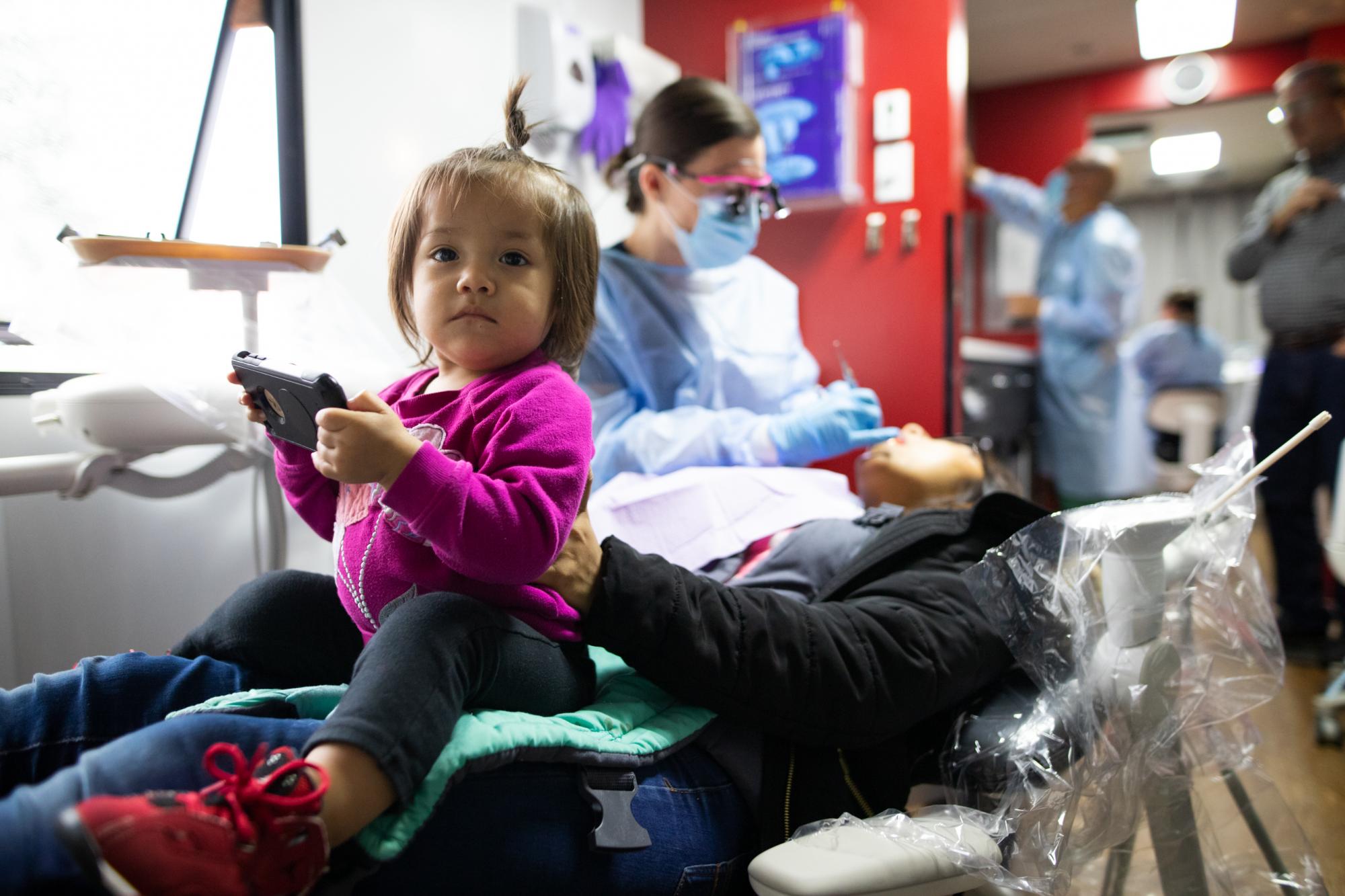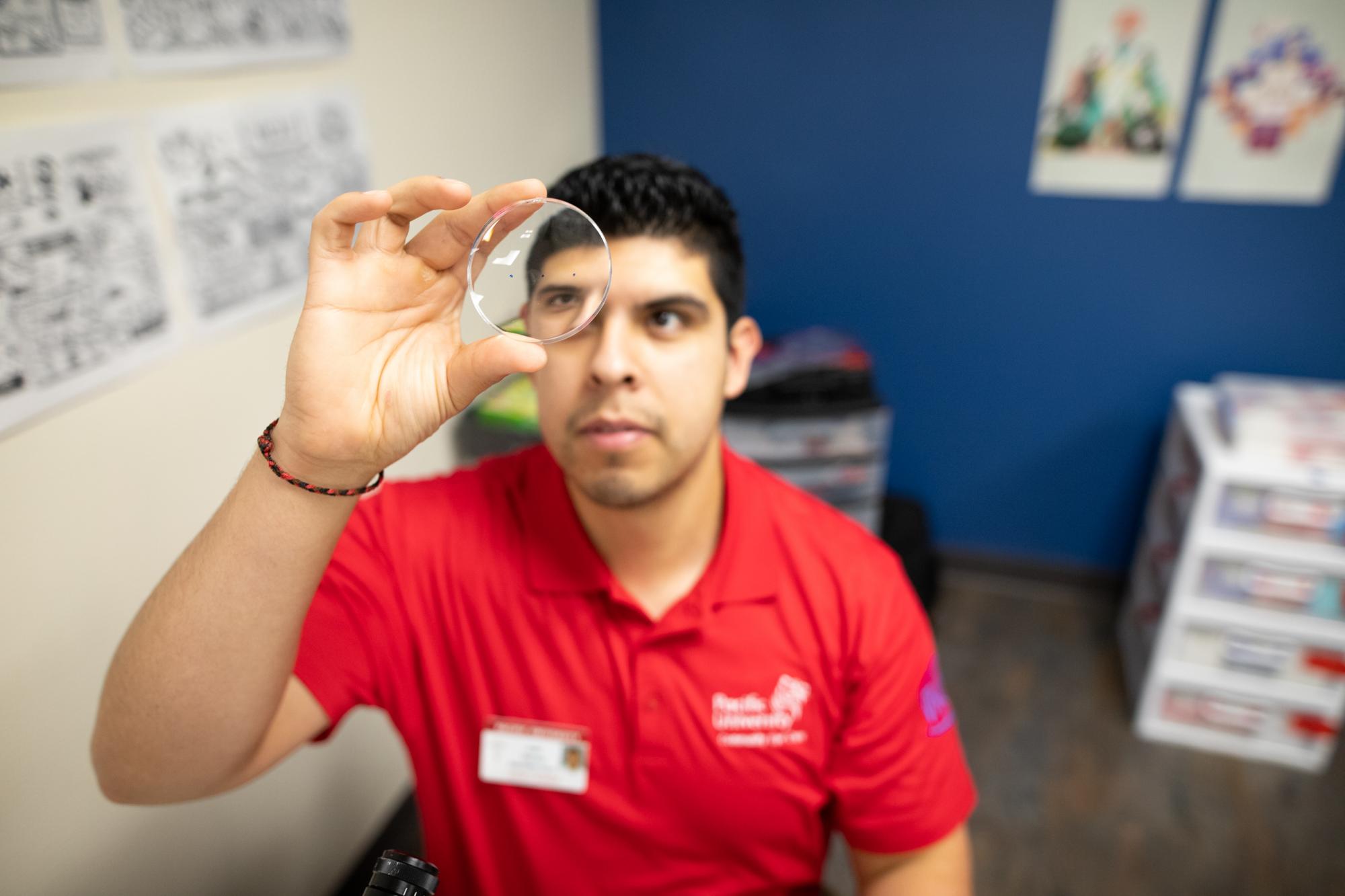Pacific Health Professions Students Provide Services at Project Homeless Connect Event in Hillsboro
 HILLSBORO — With 15-month-old Valerie lying against her chest, Dulce Loayza, 23, of Aloha, Ore., leans back in the dentist’s chair inside the Pacific University mobile dental van at Hillsboro’s Sonrise Church.
HILLSBORO — With 15-month-old Valerie lying against her chest, Dulce Loayza, 23, of Aloha, Ore., leans back in the dentist’s chair inside the Pacific University mobile dental van at Hillsboro’s Sonrise Church.
Loayza, 23, is getting her teeth cleaned during Project Homeless Connect, a Washington County program that brings together providers of many services to provide care and treatment to people who might otherwise go without. After her teeth cleaning, Loayza is taking her other two daughters to get their hair cut elsewhere within the church building.
Pacific’s dental van and its EyeVan are anchors of the event, with people who identify as homeless and low-income queueing up for evaluations that may result in on-the-spot cleanings or new glasses, or both. Students and faculty members from the College of Optometry, the School of Dental Hygiene and the School of Occupational Therapy work in teams to care for their one-day clients.
Project Homeless Connect is one of the most prominent examples of the way students in Pacific University’s colleges of Health Professions and Optometry gain experience by working in the communities where they study. The event also illustrates the way students can cross-train with other disciplines, as when occupational therapy students take medical histories of dental hygiene clients, or when dental hygiene students refer clients to their counterparts in optometry.
Some undiagnosed medical conditions become evident in examinations of clients’ eyes and mouths. Dental hygiene practitioners may treat clients with diabetes, for example, says Dr. Wilber Ramirez-Rodrigues, who’s managing the dental van. “It also affects the eyes.”
In the optometry queue, says Lisette Romig, the College of Optometry’s community outreach coordinator, students “see a lot of disease, glaucoma, diabetic retinopathy, and sometimes macular degeneration.” But, she added, most people come in for glasses.
In another room, optometry students are helping clients try on frames and assess their shapes and sturdiness.
 “I’ll be too hard on these,” says a woman in a tie-dyed top, testing the wings of a pair of sample frames. She picks up another pair. “Do you think this shape is good for me?” she asks an optometry student.
“I’ll be too hard on these,” says a woman in a tie-dyed top, testing the wings of a pair of sample frames. She picks up another pair. “Do you think this shape is good for me?” she asks an optometry student.
Nearby, other students are crafting glasses on the spot, grinding lenses according to the results of evaluations conducted by other optometry students. The small operation churns out dozens of readers and single-vision glasses during the day.
Elsewhere, John White, a professor in the School of Occupational Therapy, stands ready with wrenches and a vise, prepared to help tune up wheelchairs or other mechanical devices. Around him, occupational therapy students are meeting clients, providing a range of services including offering mindfulness practice and leisure activities, which are designed to reduce the stress in the lives of people who don’t necessarily know where they will sleep or get their next meals. It’s a student-driven initiative that is part of an emphasis on what White calls “occupational justice.”
Kim Marshall, Project Homeless Connect’s Washington County director, estimated that the Jan. 24 event served up to 400 people. Clients are drawn by word of mouth and by fliers placed in shelters, libraries and published by partners. Pacific University is a longtime supporter and provider of services for the events.


